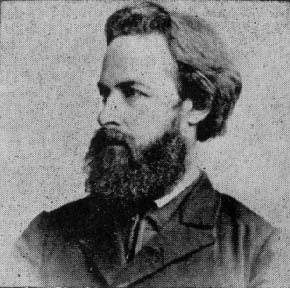
Elisée Reclus
Bio:
Born in Sainte-Foy-la-Grande, France 1830, died in Torhout, Belgium 1905; anarchist and geographer; belonged to the inner circle of Bakunin's Alliance Internationale; took part in the Paris Commune and was imprisoned and banished; lived in exile in Switzerland; after 1894 professor at the Université Nouvelle in Ixelles, Brussels; became, after Peter Kropotkin, one of the most important international anarchist writers, connected with La Révolte and Les Temps Nouveaux; his publications include `La Nouvelle Géographie Universelle' and `L'Homme et la Terre'.
HUMANITY AND THE EARTH/L’HOMME ET LA TERRE: THE LEGACY OF ELISEE
RECLUS October 27-29, 2006 Loyola University New Orleans, LA USA Last
year marked the 175th anniversary of the birth of Elisée Reclus and
the 100th anniversary of his death. A conference in New Orleans
scheduled on the occasion of this double anniversary was postponed
because of the destruction caused by Hurricane Katrina, but it has
been rescheduled for this Fall. At that time we will gather to discuss
the life and work of Reclus and to investigate the ways in which his
legacy is relevant to our world today. Reclus is considered by many to
be the greatest geographer of his age and is generally recognized as a
pioneering figure in the development of social geography. His
eighteen-thousand page Nouvelle Géographie Universelle was a
monumental intellectual achievement which, as geographer Gary Dunbar
observes, “for a generation was to serve as the ultimate geographical
authority” and constituted “probably the greatest individual writing
feat in the history of geography.” His work culminated in the
thirty-five-hundred-page L’Homme et la Terre, a grand synthesis of his
ideas concerning geography, history, philosophy, politics, sociology,
religion, anthropology, and many other fields.
Reclus, perhaps more than any other 19th century social thinker,
contributed to the development of a comprehensive ecological world
view. His focus on our place in nature is expressed in the opening
words of L’Homme et la Terre: “Humanity is Nature becoming
self-conscious.” Reclus can be seen as a founder of both social
ecology and political ecology, inasmuch as he carefully traced the
interconnections between the social, the political and the ecological,
and he saw the solution to ecological problems as necessitating a
wide-ranging, and indeed revolutionary political and economic
transformation of society.
In addition, Reclus was a major social philosopher and one of the
foremost theorists of anarchism. His analysis of the state,
capitalism, technology, racism, patriarchy, authoritarian culture and
the domination of nature constitutes perhaps the most far-ranging
critique of domination in the history of anarchist thought. He was
also an important figure in the development of urbanism, was one of
the most original theorists of libertarian education, and made
important contributions to ethical vegetarianism and the consideration
of our treatment of other species.
Finally, Reclus lived an extraordinary life as a scientist, scholar,
revolutionary and human being. He saw all his diverse activities as
integral expressions of his commitment to the struggle for human
freedom and of his concern for the good of humanity and other living
beings. Biographers have described his life as an inspiring example of
compassion, solidarity, egalitarianism, dedication, humility,
intellectual curiosity, joy in living, and a deep love of humanity and
nature.
Conference presentations, which should be in English, may address any
area of the legacy of Reclus, the person, the revolutionary, the
geographer, and the social and ecological philosopher. Requests for
further information and proposals for presentations (which are due by
May 31), should be sent, preferably by email, to:
John P. Clark
Department of Humanities
City College
Box 79
Loyola University
New Orleans, LA 70118
clark@loyno.edu
**********************************************
Geology: Vol. 7, No. 4, pp. 189–192.
Elisée Reclus—Neglected geologic pioneer and first(?) continental drift advocate
James O. Berkland
Environmental Management Agency, Santa Clara County, Government Center, San Jose, California 95110
ABSTRACT
Some day or other … we shall know, too, whether continents and seas alternately elevated and depressed as if by some secular tide, are slowly shifting their positions round the planet (E. Reclus, 1872).
Textbooks and geologic historians have largely ignored the works of one of the pre-eminent researchers of the nineteenth century, Elisée Reclus. Although his publications regarding supercontinents and continental drift preceded those of Wegener by some fifty years, the work of Reclus was apparently unknown to Wegener. Reclus also showed great foresight regarding the antiquity of the Earth, convection-subduction, the “Ring of Fire” around the Pacific, glacial drift, the nature of earthquakes, animal reactions as precursors to earthquakes, and other aspects of geology regarded by many modern scientists as developments of the twentieth century. The works of Reclus, the so-called French Darwin, should be re-examined and reprinted, and his name should be ranked with the great geologists of the past.
© Copyright by Geological Society of America 1979